| To Part Two
To Part Three
To Part Four
A Small Boat Cruising Primer for the Brave, Hardy,
or Foolish
The image above shows the northern end of Lake Huron, with the
western end of the North Channel at the center, just north of
Drummond, Coburn, and Manitoulin Islands. The red line is a rough
approximation of the route we sailed (clockwise) on our 20-day
cruise. We covered about 250 miles and returned home to a complete
lack of enthusiastic ovations and thunderous applause—just
the way we wanted it.
It’s a big trip for a little boat, so I wasn’t sure
how it would end up. Fine, as it turns out. As I’ve said
before, you don’t have to be prepared as long as you’re
willing to suffer the consequences.
Week 1—De Tour Village to the Turnbull Islands
DAY 1: A less than impressive beginning. (4 miles)
Windy—Texas 200 windy. Waves and whitecaps and nagging
fears, a day for deep reefs, hiking out, and hoping this isn’t
as stupid as you suspect it might turn out to be. Cold. And better
yet, to reach our intended destination (Harbor Island, just visible
in the top right corner of the Google Earth image above) we have
to sail close-hauled across a northerly wind, fighting big gusts,
cold spray, and steep waves that teach me a couple of things:
1) If you’re going to run your sheet through a ring lashed
to your rudder head, you really need to install some kind of rudder
hold-down.
2) It’s pretty easy to lose an oar in the process of panic-dropping
your sail when the rudder pops off the transom and waves start
breaking into the cockpit.
And what the hell, a few bonus epiphanies:
3) When you have a waterproof compartment, it’s pretty
dumb not to put your clothes in it.
4) Especially if the bag you’ve packed your clothes in
isn’t waterproof.
5) But at least you do wash ashore eventually when you’re
sailing past a lee shore as the crisis appears.
6) And so does the oar you dropped overboard.
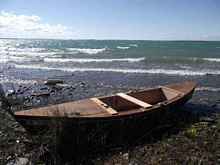 |
Jagular at Shipwreck Camp, on Drummond Island’s
west shore. |
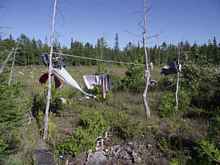 |
Afternoon entertainment at Shipwreck camp. |
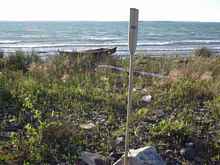 |
The oar. |
DAY 2: On to Hilton Beach! (22 miles)
Here’s what we learned today:
1) Rowing isn’t a bad way to travel; thirteen miles today
before the promised southeasterly wind arrived. Of course, we
covered those thirteen miles at—well, you can’t even
call it a walking pace. Still, hop overboard, follow our path,
and see how much walking you end up doing.
2) A drysuit with a neoprene neck seal is NOT a rain suit.
3) Especially when you leave the neck seal unfastened all day.
4) People in big sailboats spend a lot of time motoring.
5) Is a moving sailboat with furled sails and a running engine
really a sailboat? I don’t think so.
6) Canadian Customs has a sense of humor. “What make and
model is your boat?” (It’s home-made, I say. Over
the phone, a chuckle.) “How long is your boat?” (Fourteen
feet. On the phone, outright laughter.) “Good luck.”
That’s it. We’ve just cleared customs.
7) After a long day of shivering in a cold rain, nothing beats
a motel room with a hot shower.
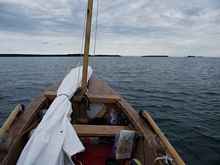 |
O Canada! St. Joseph Island, Beef Island, and
Salt Island dead ahead as we cross the border (best as we
can figure, anyway; GPS, hell!) |
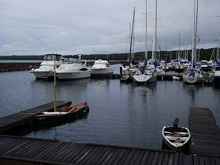 |
Jagular in the Hilton Beach marina. He’s
little, but he’s tough.
|
DAY 3: Eastward, ever eastward. (13 miles)
A beautiful day of sailing. Some easy downwind in light airs,
some exhilarating sailing on a gusty beam reach, a little berry-picking
on Cedar Island, some fully-reefed terror, and a campsite on a
God-forsaken rock with the entire cast of Alfred Hitchcock’s
The Birds. And more cruising lessons:
1) Restaurant breakfasts make for late starts.
2) But that’s ok.
3) The leeboard cleats on a Pirate Racer make perfect sheeting
points for the 68 sq ft balance lugsail from Jim Michalak’s
Mixer design.
4) Raspberries. ’Nuff said.
5) Guano-covered granite provides a very soft tent platform.
6) A bad sense of smell is not necessarily a disadvantage when
cruising.
7) Especially if you make a habit of camping on gull-infested
rocks.
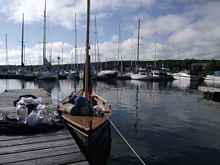 |
Packing for departure at the Hilton Beach marina.
Yep, all of that stuff piled up there fits through a single
8” diameter hatch in the forward bulkhead. In theory. |
 |
Jagular “ashore” on the northwest
tip of Cedar Island. Most landings on the trip were similar:
ankle-deep water with a rocky bottom. Easy to get close to
shore, a little harder to actually get the boat out of the
water, especially when fully loaded with camping gear. |
 |
Well, we have to camp somewhere tonight… |
 |
Home sweet home. That stuff that looks like
gravel? Yep, it’s gravel. Bedded in guano. |
 |
Africa Rock at sunset. Jagular is just visible
near the east (left) edge of the rock. |
 |
All packed up and ready to head out on Day 4.
In the North Channel, it helps to have a boat you can drag
up onto a rocky shore. Especially if your “anchor”
is a $3.69 Farm & Fleet special you’ve borrowed
from your brother. |
DAY 4: The hell of a thousand tacks. (12 miles made
good, 86,562 miles sailed)
Row to Thessalon Point, hoist sail when the wind appears. Heading
southeast, port tack. Tacking. Heading northeast, starboard tack.
Tacking. Repeat ad infinitum.
Wind shift. Thunder. Lightning. Big black badass clouds and
lots of wind. More lightning. Looking for somewhere to come ashore
past the sharp-toothed boulders and granite ledges scattered all
along this stretch of coast, hidden just beneath the surface,
appearing and disappearing suddenly among waves big enough to
drop us onto a rock and knock the bottom out of the hull if we
hit a trough at the wrong moment. Surfing in between the rocks
to a tiny strip of sandy beach. Realizing:
1) Yep, that second set of reef points wouldn’t have been
a bad idea.
2) A boat much bigger than Jagular probably wouldn’t make
it ashore along this stretch in any kind of wind and waves.
3) Jagular and I might not make it ashore along this stretch
if we tried it again in conditions like that—we got lucky.
4) Wasps like to hang out in abandoned outhouses.
5) And they do not appreciate unsolicited guests.
6) Although they won’t pursue you all the way to the beach
if you move with alacrity.
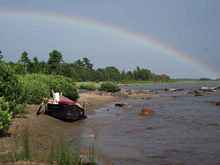 |
We made it through the rocky shoals by the skin
of our teeth. I thought the rainbow was a nice touch. |
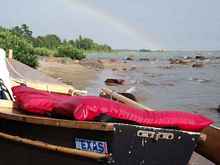 |
Where’d you get that cool sticker? |
Day 5: Welcome to the North Channel. (11 miles)
Hoist sail, running unreefed before a pleasant westerly. Make
that an energetic westerly. No, brisk and gusty. Terrifying, in
fact. Stop at Richelieu Island to tie in a reef and eat some raspberries.
Windy now, a howling whistle that tears deep curling waves into
the surface of the water. Into the drysuit for the re-launching.
Scared to jibe back onto course, do it anyway. Not so bad. And
islands now—we’re running dead downwind past the French
Islands, the gateway to the real North Channel. Beautiful rocky
crags and pine forests.
Surfing now, running parallel to shore on a starboard tack,
not sure how I’ll get in. A jibe would be disastrous. Worse,
I’m also too chicken to head further out, which means we’re
headed directly for the reef marked on my chart somewhere close
ahead. If I could spare a moment’s attention to look, I’d
see the buoy marking the end of the shoal way out to starboard.
Half a mile outside our present course.
Today’s lessons:
1) Nothing spells A-D-V-E-N-T-U-R-E like the threat of sudden
disaster.
2) In a boat like Jagular, waves don’t have to be very
big before they’re TOO big.
3) The often-mentioned theoretical benefits of being able to
rapidly drop your balance lug rig in a crisis by simply uncleating
the halyard and letting everything fall into the cockpit? Those
theories hold up under empirical testing.
4) I don’t know if a bucket in the hands of a frightened
sailor is the FASTEST method of removing water from your boat,
but it can be pretty damn fast.
 |
Stopping at Richelieu Island to tie in a reef.
|
 |
The view from the summit of Richelieu Island,
looking due east. Getting breezy. |
 |
Running dead downwind, making good time. Windy!
Really could use that next set of reef points now. Just a
few miles ahead, all unbeknownst to us, we’ll run into
trouble and be lucky to remain upright. |
 |
The deserted cove we discovered after rowing
ashore from our near disaster. Jagular is on the beach just
right of center.
|
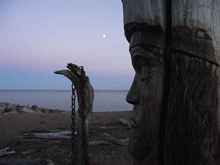 |
We weren’t the first ones to find the
cove…
|
Day 6: On to the Turnbulls.
In which we learn some things, such as:
1) That nice vistor’s dock in the marina? The one at the
perfect height for a small boat like Jagular? It might not actually
be connected to shore.
2) Bacon and Coke. It’s not just for breakfast anymore.
3) But it makes a damn GOOD breakfast all the same.
4) And sometimes everything goes just right: broad reaches and
moderate winds and a perfect sandy-beach cove you find tucked
in a scattering of rocky islands just as the sun drops below the
horizon and the wind dies down to nothing.
Some further revelations:
5) There’s a hole in my drysuit.
6) Which explains why my right foot has been wet every time
I take it off. (The drysuit, not the foot).
7) And when the big boats anchored in the cove a half mile away
find out you sailed your little boat all the way from Michigan,
they want to feed you brats and venison steaks.
8) And give you cold beer.
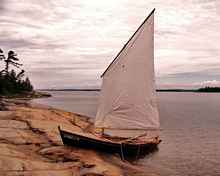 |
Landfall in the Turnbulls: Jagular on Caroline
Island. |
 |
Camp in the Turnbulls. A nice place to hang
out. |
DAY 7: Hanging out. (0 miles)
It wouldn’t be cruising if you didn’t spend a day
hanging out every now and then. A perfect day for a rowing expedition
to Round Island. Which just goes to show:
1) On a really windy day, it’s a lot less scary rowing
than sailing.
2) Those cliffs on Round Island? Yep, there’s a way up.
3) But it’s pretty scary.
4) The kind of thing you’d never do if you weren’t
halfway up already.
5) With no easy way down.
And I learned some other stuff, too:
6) Unless you intend to stay on Round Island for a really long
time, you have to get down sometime, anyway.
7) No matter how scary it is.
8) And you can run aground in the North Channel in a boat with
a 5” draft.
 |
Round Island. As soon as I saw it, I knew I’d
have to try and climb those cliffs. |
 |
Luckily there was a landing spot. |
 |
Wasn’t easy getting up there. Harder getting
down. |
 |
Looking south from the summit of Round Island,
the Turnbulls spread out across the horizon. Can’t quite
see the tent from here, but almost—a twenty-minute row
in calm conditions. |
 |
Leaving Round Island, heading south back to
the Turnbulls. All this before breakfast! |
 |
Canadian eagles are wimpy. This one got chased
into this tree by a gull, where he had to hang his head in
shame. |
 |
Sunset in the Turnbulls. Laundry day. |
End of Part One - To Be Continued...

|

